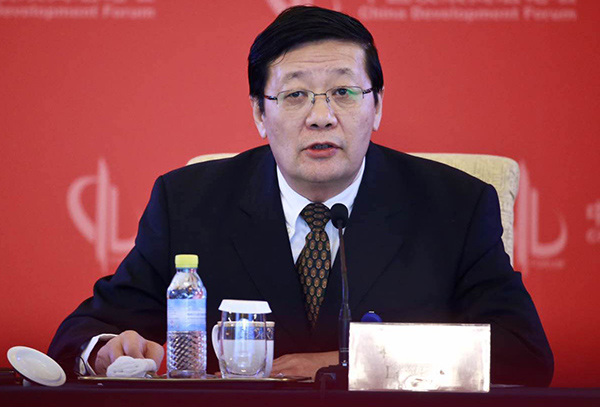

 |
| China's Finance Minister Lou Jiwei speaks at the China Development Forum in Beijing on Sunday. [Photo by Feng Yongbin/China Daily] |
'No major negative response' to lowered outlook from Moody's
Finance Minister Lou Jiwei has shrugged off the lowered outlook on China's sovereign credit ratings by US ratings agency Moody's Investors Service early this month.
There has been no major negative responses from either the international or domestic markets to the change, he told the China Development Forum in Beijing on Sunday.
"We don't care much about the ratings," the minister said.
Moody's cut its credit rating outlook on China and its biggest banks from stable to negative in early March, citing the country's rising debts and "inadequate capability to carry out reforms".
Lou said he understood Moody's concerns, but said it had failed to take into consideration China's efforts to cut overcapacity and to deleverage — measures clarified during the two sessions held from March 3 to 16.
He said it is unreasonable that the agency has raised the outlook on Greece despite the European country's serious debt problems, while cutting the outlook on China, whose economic situation is much better than that of Greece.
In September, Moody's raised the outlook on Greece's sovereign credit ratings to "stable" from "negative", and in February upgraded the credit ratings of its four key lenders.
Liang Haiming, chief economist of China iValley Research Institute, a think tank in Beijing, said, "Moody's has obviously used double standards."
Analysts said Moody's downgrading of China's rating outlook fails to take into account the country's improving economic fundamentals.
Attending the forum, Vice-Premier Zhang Gaoli said that judging from first-quarter data, the economy remains resilient although it faces downward pressure.
He said the main economic indicators have improved since the start of the year and if this trend continues, the Chinese economy will get through its difficulties.
The country's year-on-year GDP growth was 6.9 percent last year, the slowest since 1990. But data from the first two months of this year, such as fixed-asset investment, point to an initial stabilizing in economic activities.
Meanwhile, the economic structure has become more balanced, with consumption and the service sector replacing investment and industry to become the largest contributors to growth.
Political leaders, entrepreneurs and scholars taking part in the forum said the economy will remain sound if it can push forward with its restructuring and reform agenda in the medium and long term.
Dennis Nally, chairman of PricewaterhouseCoopers, said on the sidelines of the forum, "If you believed in the potential of China 12 months ago, the fact that it hit some bumps, which I believe are all short term, shouldn't impact your view on the long-term potential of the economy".
 Thai most beautiful transgender Nong Poy release new photos
Thai most beautiful transgender Nong Poy release new photos Now and then photos of Shanghai Jiaotong University
Now and then photos of Shanghai Jiaotong University Is this what air travel will look like in 2050?
Is this what air travel will look like in 2050? Aerial view of watermelon terraces in S China's Baise
Aerial view of watermelon terraces in S China's Baise Traditional wedding of a post-80s Tibetan couple
Traditional wedding of a post-80s Tibetan couple Models in cheongsams present classical oriental beauty
Models in cheongsams present classical oriental beauty Second commissioned C28A corvette made by China enters Algerian Navy
Second commissioned C28A corvette made by China enters Algerian Navy Intoxicating Wuyuan in spring
Intoxicating Wuyuan in spring Gold and silver wares of Qing Dynasty exhibited in Shenyang Imperial Palace
Gold and silver wares of Qing Dynasty exhibited in Shenyang Imperial Palace Top 20 hottest women in the world in 2014
Top 20 hottest women in the world in 2014 Top 10 hardest languages to learn
Top 10 hardest languages to learn 10 Chinese female stars with most beautiful faces
10 Chinese female stars with most beautiful faces China’s Top 10 Unique Bridges, Highways and Roads
China’s Top 10 Unique Bridges, Highways and Roads Challenges seen in attracting foreign capital
Challenges seen in attracting foreign capital  Suspected matricide case highlights mental health problems in China’s elite colleges
Suspected matricide case highlights mental health problems in China’s elite colleges  Peering into North Korea from China’s border
Peering into North Korea from China’s border  Cross-Straits ‘diplomatic truce’ still holds
Cross-Straits ‘diplomatic truce’ still holds Day|Week